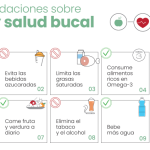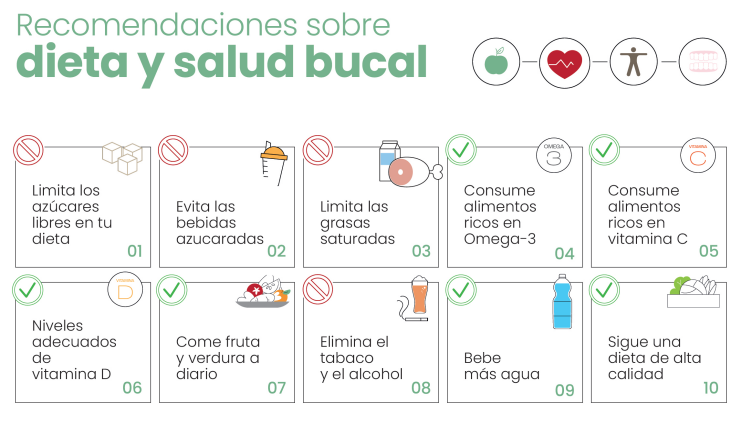
It is considered that dentists and hygienists have the opportunity to have a very positive influence on the reduction and elimination of habits that are clearly harmful to health..
A report prepared by experts from the Spanish Society of Periodontics (SEPA) in collaboration with the Spanish Society for the Study of Obesity (SEEDO), and reviewed by the Working Group ‘Diabetes and Periodontitis of the Spanish Diabetes Society and the Spanish Society of Periodontics’, exposes the close relationship that exists between diet and oral health and provides a decalogue of essential recommendations to help maintain or improve the health of your mouth and, of course, that of your entire body.
“With this document we take another step in the permanent commitment of the oral health team to the promotion of the oral and general health of the population,” indicates the Dr. José Nart, president of the Spanish Society of Periodontology and SEPA Foundation, who emphasizes that “the dental health team should include basic dietary advice to all patients, recommending increasing the intake of fish oils, fiber, fruits and vegetables and reducing levels of refined sugars. This benefits general health and periodontal health.”

The report has been prepared by a multidisciplinary team of experts, including periodontists, endocrinologists and obesity specialists. The authors are Cristina Serrano, Agustín Casas, María del Mar Malagón, Eduardo Montero, Virginia Bellido, Bettina Alonso and Mónica Muñoz. The document has been presented within the framework of the Congress of Periodontics and Oral Health (Sepa Bibao’24), which is bringing together more than 4,500 professionals in the Basque capital and which has a session on nutrition, obesity and periodontitis to debate on oxidative stress, nutrition and periodontal health (Iain Chapple)obesity and periodontitis (María del Mar Malagón) and obesity as a predictive factor of worse response to periodontal treatment (Jeanie Suvan).
Obesity is a risk factor for periodontal disease, with inflammation as a point of intersection between both pathologies.
“The scientific evidence of the relationship between diet and periodontal health is increasing, Therefore, we believe that these simple recommendations can help both patients and professional oral health teams,” highlights the Dr. Cristina Serrano, periodontist and coordinator of this report. According to her, she adds, “dentists and hygienists have the opportunity to have a very positive influence on the reduction and elimination of habits that are clearly harmful to health.”
A common goal
In the same way as happens with the rest of the chronic non-communicable diseases, An unbalanced diet negatively influences oral diseases, and, on the other hand, poor oral health also negatively affects general health.
In this situation, it is advisable to adopt a series of basic measures regarding nutrition, many of them already known but which are synthesized, scientifically argued and explained in a simple way by the authors of the report, also providing useful information about the impact on oral health of each suggested measure.
As recommendations, the following is indicated: limit free sugars in your diet to 5-10% of total energy intake, as recommended by the WHO; avoid sugary drinks, which include carbonated or non-carbonated soft drinks, fruit or vegetable juices, liquid and powder concentrates, flavored water, energy and sports drinks, ready-to-drink tea and coffee or flavored milks; limit saturated fats; increases consumption of rich foods in mono- and polyunsaturated omega-3 fats; consume foods rich in vitamin C; maintain adequate levels of vitamin D by eating oily fish and eggs; eat fruit and vegetables daily, of all colors, source of antioxidants; eliminate tobacco and alcohol; drink more water; and follows one high quality diet, such as the Mediterranean or Atlantic diet, which are good for general health and oral health.
Obesity and gum health: the inflammatory link
There is growing evidence that demonstrates how obesity is a risk factor for periodontal disease, with inflammation as a point of intersection between both pathologies.
“There is, therefore, a real need for both health professionals who are experts in obesity and experts in Periodontology to know the relationship between obesity and periodontitis in order to raise awareness among the population and offer the most appropriate care to people living with these diseases,” advises the Dr. María del Mar Malagón, president of the Spanish Obesity Society, who describes “The collaboration between SEPA and SEEDO is essential to help professionals understand the complexities of obesity.” and convey to patients the importance of maintaining a healthy weight and good oral hygiene and, vice versa, that medical professionals integrate periodontitis as a potential comorbidity of obesity and contribute to the prevention of this disease.”
Excess pro-inflammatory products in the diet, such as refined sugars or saturated fats, are related to local and systemic inflammation
Periodontitis, like other chronic inflammatory diseases such as obesity, diabetes, cancer or cardiovascular diseases, It is conditioned by a series of risk factors and indicators. One of these indicators is food. “We have more and more information about the benefits and harms of diet and how they contribute to activating or reducing inflammation,” explains Dr. Cristina Serrano.
Excess pro-inflammatory products in the diet, such as refined sugars or saturated fats, are related to local and systemic inflammation. However, a diet low in these substances, and rich in foods with omega-3 fatty acids, vitamin C and D and micronutrients derived from fruits and vegetables, helps reduce inflammation.
It has been observed in numerous studies that people with obesity (both in childhood and in adulthood), despite the accumulation of bacterial plaque on their teeth, have a greater predisposition to suffer from gum inflammation, which, if not If treated appropriately, it can lead to periodontitis (which is characterized by progressive loss of the tissues surrounding the tooth); This pathology, if not treated adequately, can evolve and cause tooth mobility and subsequent loss. “It is estimated that a person with obesity has approximately 3 times the risk of suffering from periodontitis, and this is independent of age, race or tobacco consumption; Furthermore, the higher the Body Mass Index (BMI), the risk of periodontitis increases linearly and that it is more serious and progresses more quickly,” says Dr. Cristina Serrano.
In short, as this expert concludes, “It is easier for a person with normal weight to have healthy gums than a person with obesity” and, therefore, “people with obesity (whether it is their BMI or their waist circumference that is high, or both) should take much more care and inspection of their gums.”

